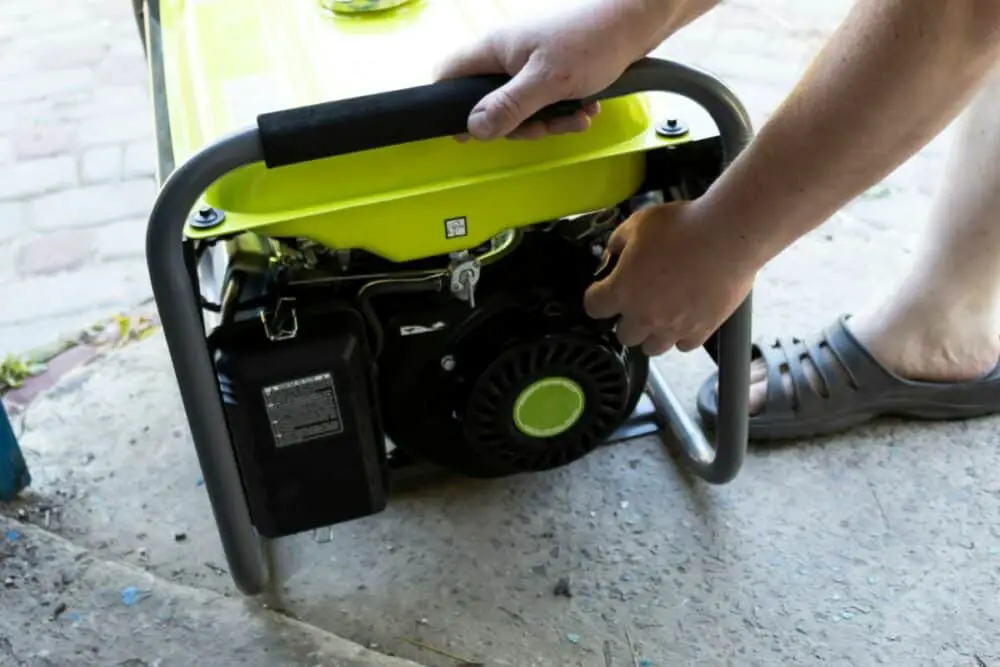Air conditioners make a huge difference in comfort when the power is out. Having a backup generator that can run your AC is an important consideration.
Air conditioners come in many sizes and power capacities. Choosing the right one will take a bit of research and some math.
As a general rule, you should choose a generator that supplies 25% more power than you anticipate needing. This will give you plenty of power for surge power and unexpected power needs.

Contents
What Size Generator Can Power an AC?
When you are shopping for a generator/ac combination you need the following information.
- Your ACs Running Watts
- Your ACs Starting Watts
You can find these on a sticker on your air conditioner, on the SA sticker.

You will notice that the sticker does not list the watts.
Find the watts by multiplying amps times volts.
So for the window, AC unit sticker above you would need to multiply 115 times 4.6 and you get 529 watts.
It is a good idea to add an additional 25% when calculating the power needs. Multiply your watts by 1.25 to get the new total, which is 661 in this case.
The energy guide sticker does not give this information, it is just designed to let you know how much energy an appliance uses in comparison to other appliances.
Calculating Your Power Needs
Find this information for the air conditioner that you are looking at buying and then set off to get a generator to match.
| Air Conditioner Running Watts | |
| Air Conditioner Starting Watts | |
| Total Watts (Running + Starting) |
This will give the total watts you need from your generator to run your air conditioner.
You will notice that the window AC unit pictured above does not list starting watts. Yours may or may not.
If you will be running multiple devices with your generator, you will need to add together the total watts needed to run all the appliances to determine your generator needs.
This portable generator calculator can be a good place to start.
Common Generator Sizes
Generators come in a very large variety of sizes from very small generators to whole house generators, but we can think of portable generators as falling into three categories: Small Generators, Medium Generators, and Large Generators.
Small Generators
2,000 watts to 2500 watts are considered small generators.
You may see them labeled as 2kW or 2.5kW or kilowatts.
Small generators will not run most AC units, but they will run other cooling devices like fans.
Medium Generators
3000 watts to 3500 watts are considered medium generators.
Medium generators are much more capable of powering an air conditioning unit. Be sure to choose an ac unit that runs on 120 volt, which is the output of most medium generators.
Large Generators
6,000 watts to 11,000 watts are considered large generators.
Large generators are capable of running multiple devices and may have more or different outlet configurations.
Large generators can run many types of air conditioners while also running other tools or appliances.
Larger generators cost more money and require more fuel to run, they may also be noisier.
Choose a generator with a soft start or an electric start if possible.
Common Air Conditioner Sizes
BTU Sizes
Air conditioners are sized by BTUs. Common sizes are:
- 5,000 BTU
- 8,000 BTU
- 12,000 BTU
- 18,000 BTU
- 24,000 BTU
There are plenty of sizes in between. BTUs or British Thermal Units are a measure of power in an AC unit.
The larger your space the more BTUs will be required and the more power will be needed to run the unit.
Voltage Sizes
Air conditioners are available in many voltages:
AC –
- 110/115
- 120
- 240
DC –
- 24
- 48
Air conditioners are designed to run on AC or DC power, and if you will be running it with a generator most of the time, you should be sure that your generator produces the same type that your air conditioner needs.
Mini-split units are very energy efficient. They are often a good choice for off grid applications, but small window units can be a lower cost and efficient cooling option.
Converting BTUs to Watts
Air conditioners are generally rated in BTUs. BTU stands for British Thermal Units, and it refers to the amount of energy it takes to raise one gallon of liquid one degree. It is a measure of how much the unit can change the ambient temperature.
When you are shopping for an AC unit, it can be very difficult to find the watts, especially when shopping online.
There is a handy formula for determining how much energy an air conditioner will use by converting BTUs to watts.
To find the watts, multiply BTUs times 0.293.
A small window unit often has a BTU of 5,000, so 5000×0.293 gives you 1465 watts.
It is important to understand that the result of the calculation is the BTUs per hour to watts as watts is associated with a rate of power over time and BTUs are not.
This calculation is useful when shopping as long as you understand that it is not a perfect estimate, but it can give you an idea.
These calculations are very difficult and it is probably necessary to talk to a professional before committing to these large purchases.
What is the best kind of generator to run an air conditioner?
When you are choosing a generator you will need to balance a few factors:
- Noise
- Local Restrictions
- Environmental Impact
- Fuel Availability
- Budget
Gas and diesel generators will put out enough power to run most air conditioners. The trade-off is the noise and environmental impact.
Gas generators are a great choice to get started with off-grid power as they are affordable and powerful.
One user reported that they needed about $10 a day in fuel to run an air conditioner so be sure to balance the starting and running costs.
Gas and diesel generators are not allowed in some areas because of the environmental impact and the noise.
The Honda generators have a reputation for being very quiet, but they will still not be allowed where gas generators are disallowed.
The Predator generators available at discount hardware stores have a good reputation for being a reliable budget option.
Propane generators are a good option if you do not want to go solar, but you will be traveling to locations where gas and diesel are not allowed.
These powerful generators are often capable of running off gas or propane. Called bi-fuel or tri-fuel generators, these generators give you options.
Be sure to consider the availability of propane when selecting this fuel type.
Solar Generators or a solar power system can be a very expensive way to run an air conditioner.
It is important to choose the right air conditioner if you plan to run it with a solar generator or solar power generator.
The most popular air conditioner for van-lifers and skoolie builders is the mini-split. These efficient air conditioners are the best choice to pair with solar power.
What is the best air conditioner to use with a generator?
Running AC exclusively from a generator is necessary for some situations. Camping and off-grid cabins or RVs generally rely on generator power and ac can make a big difference in your comfort on a trip.
There are a few choices for air conditioners that can be run on a generator, you can choose the one that best suits your needs and energy capacity.
Swamp Cooler
Swamp coolers use evaporation to cool the air. They use a fan to pass air through wet filters to cool the air.
They do not work in very humid weather as they cannot cool the air with water.
These units are incredibly efficient and there are models available that can run on as little as 60 watts.
Window Unit
Window units may not be the slick exciting choice you are hoping for, but these tried and true appliances are an inexpensive way to cool a small space.
They are affordable and can be used in any room with a window.
Window units use between 500 and 1,500 watts.
Mini-Split
Mini-split units are the newest types of air conditioner, and they are well-liked for their efficient energy use.
These units are also called ductless units as they do not require traditional HVAC ductwork. This makes them incredibly easy to install in an older building or nontraditional space.
They consist of one or more indoor units that contain a fan and evaporator connected to an outside unit that contains the compressor.
They use between 500 and 700 watts per zone of use, and they can have multiple zones.
Now, if you do not strictly need air conditioning, a fan can make a huge difference. If you plan to use air conditioning, consider bringing fans to more easily distribute the cold air around your space.
Window Fan
In some situations, it may be possible to manage the temperature with a fan alone.
Installing a window fan will prevent the need for electrical wiring and professional installation.
Window fans come in a few varieties. Traditional box fans that can sit on the floor or be put in front of or in a window are versatile, very portable, and inexpensive.
Window fans can also be a special type of fan designed to be placed inside the window. These units tend to have two fans built-in and include spacers so you can customize the width of the fan.
These window fans are a bit less portable and versatile, but they are a great choice if you will always be using the fan in the same location.
Window fans use between 30 and 100 watts of power making them easy to run with any power source.
Rechargeable Fans
Fans that can be charged with USB are becoming more and more common and available.
Some models can even be used to charge your phone when you are away from shore power. This rechargeable fan has a clip and a battery to store power that can be used to charge your phone.
These small fans should be purchased for each member of your party as they are most effective when aimed directly at the face.
Can a whole house generator run an air conditioner?
Whole house generator systems are designed, usually by a professional, to power all necessary systems in your home, including the air conditioner.
Whole house generators are more than capable of running air conditioners, but depending on the specifics of your generator, it may not be able to cool the whole house.
Many air conditioning systems are designed to work by cooling in zones. You may have one zone for the first floor and another for upstairs. If you have a very large house there may be even more zones.
In the case of a prolonged power outage, plan to close off some rooms or zones in your home to minimize power usage.
If you need to have air conditioning, you should consider a backup generator in the unlikely case that your whole house generator fails.
Whole house generators should meet the needs of the household, but they do require regular maintenance.
Many larger systems will automatically run system checks and alert you if there is a need for maintenance or repair.
Bugs and rodents can do serious damage to your whole house generator so be sure to inspect it regularly and take measures to ensure any pest problems are discovered early.
How To Get Help Selecting An Air Conditioner And Generator
Searching online to try to find the information about electricity and generators can get confusing very quickly.
I do not recommend that you ask a salesperson at a home improvement store or big box store given these people probably just want to sell you their products. They may tell you that the appliances will work together because that is what will get you to put down your money.
Find people who do not stand to gain from your purchase.
If you would like help making your choice, check out these resources:
Forums or Groups
Finding helpful people who are doing similar projects is a great way to get ideas.
Off-grid living is growing in popularity, so join a community on Facebook, Reddit, Slack, or YouTube and ask your questions there.
They may not answer your question exactly, but by participating in the group, you can learn the skills to make your own decision.
Call an Electrician
Electricians should be able to answer any questions you have about power draw.
Call a local electrician and describe your project, ask if they have ever worked on something similar, and ask for advice.
Be sure to have your numbers in front of you. Take a picture of the label and have it in front of you. They may ask you questions and you will get the best advice with all the exact numbers.
You can hire an electrician to set up your air conditioner and generator in some situations.
Call a Manufacturer
If you have already purchased some components, it is worth reaching out to customer service to get any specs that you are unsure of.
Ask them how much power the AC will draw in watts, ask them if it can be run with a generator, and can they recommend one.
Since you have already made the purchase, it is in their best interest that you are happy with their product.
Hire a Builder
If you are working on installing new systems in your home, hire a licensed builder to install the systems and buy the generator.
Portable generators are not often part of a home project, so be sure to ask plenty of questions about the builder’s experience with portable generators.
There are builders who specialize in off-grid building, and they will be able to apply their experience to get you set up in the best way possible.
Final Thoughts
When you are using off-grid power for an air conditioner, expect there to be a learning curve. If air conditioning is necessary because of a medical need, have a backup plan.
Keep enough fuel to power your generator of choice as you may find it unavailable at your destination. Use the 25% rule and bring 25% more than you think you will need.
Try your generator at home before traveling to a new place with it. Be sure you have the user’s manual available in print or downloaded on your phone to reference should an issue arise.
Have the user’s manual available for your air conditioner as well.
You will also want to start the generator during the day when you have plenty of light and time to figure it out.
Bring fans to distribute cool air, and as a backup way to cool off should there be a problem, fans are cheap and offer a great deal of comfort on a very hot day.
Be sure to secure all components well if you will be traveling so that they are not damaged while you are moving. Air conditioners often need to be stored upright to prevent damage to the compressor.





